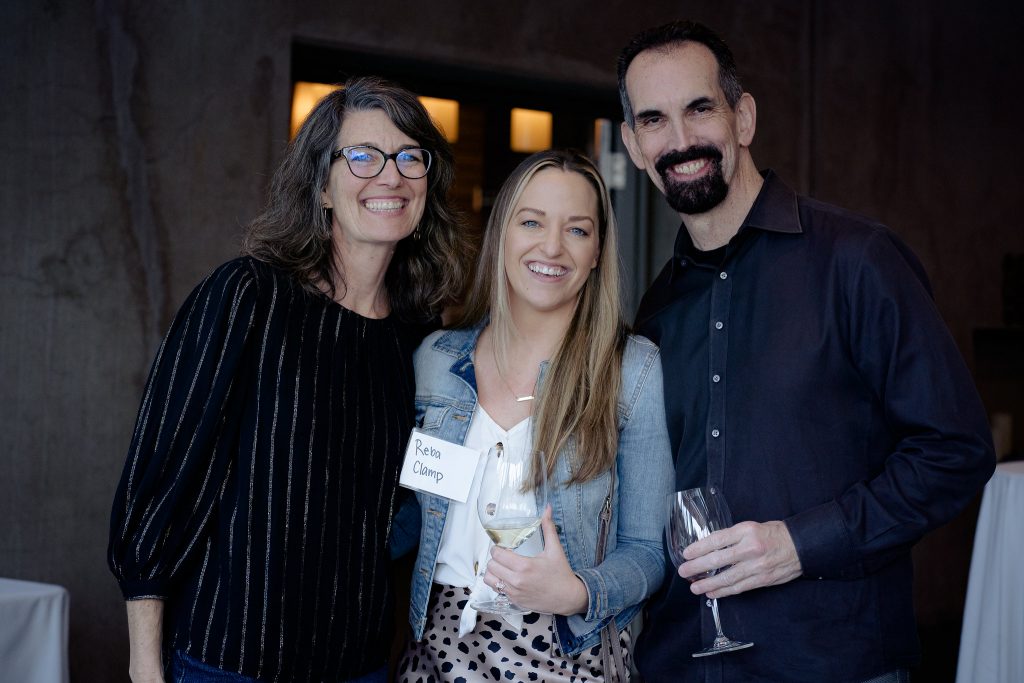
Sara: Let’s start at the beginning! Tell me a little bit about your career path, and how it brought you here?
Reba: Well, I always like to start with undergrad, where I studied musical theater and opera, because I've had a bit of a winding path – a few curves here and there. I always thought I’d pursue a professional performing career. I even moved to Montana for the summer after I worked at a celebrity resort to save up all the money to move to New York City. And I moved to New York City, and it was awful. I hate auditioning more than life itself. And so very quickly – especially because this was in the aftermath of a financial crisis – I felt like I was in a pickle.



I decided to move back to the Midwest for a little more financial stability. And I chose Minneapolis because I had a friend there who was doing some theatre there. Minneapolis has a unique theatre market in that all the auditions and rehearsals and shows take place after 5 pm. So, all the actors, even the professional ones, have full-blown careers. Not just survival jobs, they have real day jobs, they might be architects or business owners, you know. So that was when I started doing contract work. I began working at a variety of places. I don't know if you remember the company that was well-known for taking school pictures called Life Touch, but I worked for them for a while in a locked room processing orders payment orders and money. So, you're handling cash, so you had to work on camera in a locked room. Then I worked for a real estate valuation company matching appraisers with properties in the Alaska region of that company - I was responsible for finding these highly paid appraisers that could take a little float plane out to some remote area of Alaska.
Finally, I worked in family office – it happened to be the family that owns the Minnesota Twins. They're one of those wealthy families that have their hands in every industry; they made the film Brokeback Mountain, they own a million car dealerships, big real estate companies, everything. I was hired as an administrative assistant to support twelve private tax and finance managers, but it wasn’t your typical admin job at all. It was a financial assistant job, and I had some incredible hands-on training. All of a sudden, I'm reconciling over one hundred bank accounts every month, I'm calculating interest rates on internal loans using LIBOR rates that are ever changing. I didn’t realize this at the time, because I was a clueless opera nerd, but I was doing the prep work for the accountants to do their journal entry site, all the legwork. I saw a lot of things and a lot of documents, and I had no clue what I was looking at, so it almost makes sense why they chose me.
Over the four years I was in this position, I found that I really liked the black and white nature of numbers. I found a lot of comfort in spreadsheets, where things are not subjective to people's opinions. They're simply right or wrong. While I loved this family and the position, I knew there was no upward mobility – all of the other amins had been there, in their roles, for 20 or 30 years. Around this time, the Seattle job market was heating up, and I since I had never wanted to stay in Minnesota forever, I decided to up and move! I didn't have a job lined up – I just thought ‘I'll get one’. Luckily, I did, and within two weeks, I had found another contract gig – a four-month contract with Microsoft. I got the work done in two months, and that was my foot in the door at Microsoft. Then Simplicity found me!
Luckily, there was a role with Simplicity that sounded like the most perfect little project for my weird little skill set. You know, it really is amazing matchmaking. What I liked about contract work in the first place is that it’s this mutually beneficial relationship between you and the firm where the firm wants you to succeed as much as you want to succeed. You can work together to find the right work for you. My first project with Simplicity was supposed to be four months long, and I am still on that project nearly years later! It been a great role that has been able to grow with me. I feel like Simplicity and this project is my first real consulting job rather than a contract gig, if that makes sense. I loved the project so much that within, I guess it would have been about the third year, I could kind of feel like myself plateauing. I really wanted to be more effective and build my skill set so I could be more supportive to my team – sometimes I felt like I just couldn't understand the language everyone was speaking. I'm supporting the marketing team but in a financial way but I didn't study marketing and I didn't study finance. I decided to pursue my MBA. Simplicity and my client are both so flexible that it was honestly that flexibility that really allowed me to do both because I never quit working.
I went to the University of Washington Bothell, because their campus is a mile away from Kirkland and a lot of the Microsoft offices. So that meant things like work, school, and home would all be very close and I felt like that would be more manageable when continuing to work full-time. Then they offered me a way to do an accelerated schedule, so I was able to complete a two-year program in 18 months.
My goal going in was to understand all the functional areas of a business and how they interact, because that’s what I was missing. You want to understand how the work you're doing plugs into the bigger picture, right? It definitely helped with that. I feel like I can follow what's going on.
So that’s how I got here!
Sara: Such a good story! Most of the folks I’ve talked to have said that they really value the variety of consulting – but for you it was a little different. You stayed in the same role but you were able to grow within that and set boundaries to ensure that you’re can add value on your own terms!
Reba: I think working with Simplicity was the first time I felt like I was treated like a grown-up in the working world. So much autonomy, no micromanagement.
Simplicity is a very special firm. It wasn’t until a couple of years ago when I was looking at other consulting firms and comparing them to Simplicity, that I realized how simple Simplicity makes all of this. There's none of the internal noise that you run into with other management consulting firms – they have this crazy amount of internal work projects, and internal teams, which is all unpaid labor, that you must do with gusto to even be considered for a promotion. Then there’s an intense hierarchy with strict pay bands. It can really be so competitive.

Sara: Well, I loved your story, that was perfect. Do you have any advice for people who are thinking about becoming consultants?
Reba: First, you have to clarify what you value, right? To understand that you hate that busy work, or you hate politics, or you hate competition or just highly competitive environments. So, by clarifying your values, and then thoroughly researching that firm and talk to as many current and former employees as you can. This is because the sales pitches from the hiring managers and recruiters are oftentimes pretty disparate from what's actually going on. I think it's so important to talk to employees.
Then, the other piece being that everybody should keep in mind: everyone has their own unique and valuable skills. This does include you, whether you think so or not, that one was really hard for me. Make sure to have an understanding that what is second nature to you, or what comes really easily to you, is not true for everyone. I definitely had skills that were similar to the people around me similar skills so that just kind of reinforces that idea of, oh, everyone can do this. But then I started recognizing what I bring to the table that is different – things that come naturally to me that not everyone can do with ease!
Interested in a consulting career with Simplicity?